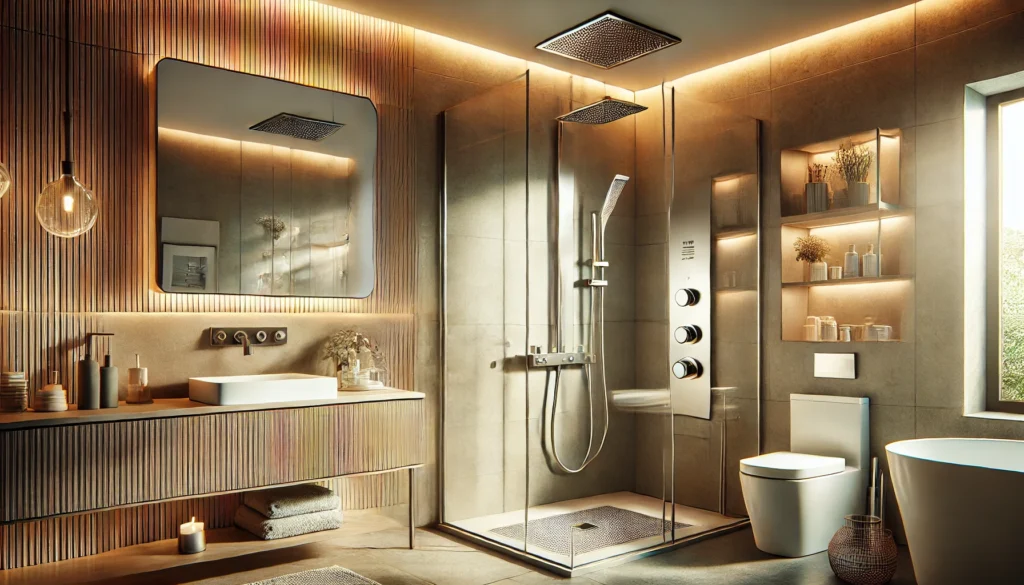
The Pros and Cons of Modern Shower Systems

Modern shower systems come in a variety of styles and technologies, each designed to suit different needs and preferences. Whether you’re looking for a luxurious spa-like experience or an energy-efficient option, understanding the pros and cons of thermostatic, electric, and power showers will help you make an informed decision.
1. Thermostatic Showers
Thermostatic showers are a popular choice for households that value consistent water temperature. These systems mix hot and cold water to deliver a steady temperature, even when other taps in the house are in use.
Pros:
- Temperature Stability: Ideal for families, as it prevents sudden temperature changes, reducing the risk of scalding.
- Customisation: Allows precise control of water temperature for a personalised experience.
- Compatibility: Can work with both high and low-pressure systems.
Cons:
- Installation Costs: Typically requires professional installation, which can be expensive.
- Dependence on Hot Water Supply: Relies on a hot water tank, so it’s not suitable for homes without one.
Best For:
Homes with a reliable hot water supply and families seeking safety and comfort.
2. Electric Showers
Electric showers heat water on demand using an internal heating element, making them an energy-efficient option.
Pros:
- Energy Efficiency: Only heats the water you use, saving energy.
- Independence from Hot Water Tank: Works even if your boiler is broken or you don’t have a hot water tank.
- Quick Installation: Easier to install compared to thermostatic or power showers.
Cons:
- Lower Flow Rate: May not deliver the same pressure as other shower types.
- Aesthetic Limitations: Some models can look bulky and less modern.
- Electrical Requirements: Requires a high-capacity electrical circuit, which might need upgrading.
Best For:
Homes without a reliable hot water system or those looking for an energy-efficient option.
3. Power Showers
Power showers are designed to provide an invigorating experience by boosting water pressure using a built-in pump.
Pros:
- High Water Pressure: Delivers a strong and refreshing water flow, even in low-pressure systems.
- Customisable Settings: Often includes multiple spray options for a spa-like experience.
- Luxury Feel: Perfect for those who prioritise a powerful shower.
Cons:
- Water Usage: Consumes more water than other systems, which can increase bills and environmental impact.
- Installation Costs: Requires professional installation, especially if a pump needs to be integrated.
- Noise: The pump can be noisy, especially in older models.
Best For:
Homes with low water pressure or individuals who enjoy a strong, luxurious shower experience.
Factors to Consider When Choosing a Shower System
1. Water Pressure:
- Check your home’s water pressure to determine which system will work best.
2. Energy Efficiency:
- For lower energy bills, electric showers are the most efficient option.
3. Budget:
- Factor in both the upfront cost of the shower and installation expenses.
4. Household Needs:
- For families, thermostatic showers offer safety and reliability. For singles or couples, electric showers might be more practical.
5. Aesthetic Preferences:
- Modern thermostatic and power showers often offer sleeker designs than electric models.
Making the Right Choice for Your Home
Selecting the perfect shower system depends on your lifestyle, home setup, and personal preferences. Thermostatic showers are ideal for families who value safety and consistency, while electric showers offer energy efficiency and convenience. Power showers, on the other hand, deliver a high-pressure, luxurious experience.
By weighing the pros and cons of each system and considering your specific requirements, you can invest in a modern shower that meets your needs and enhances your bathroom experience. Whatever you choose, a well-chosen shower system will add value, comfort, and functionality to your home.
4o